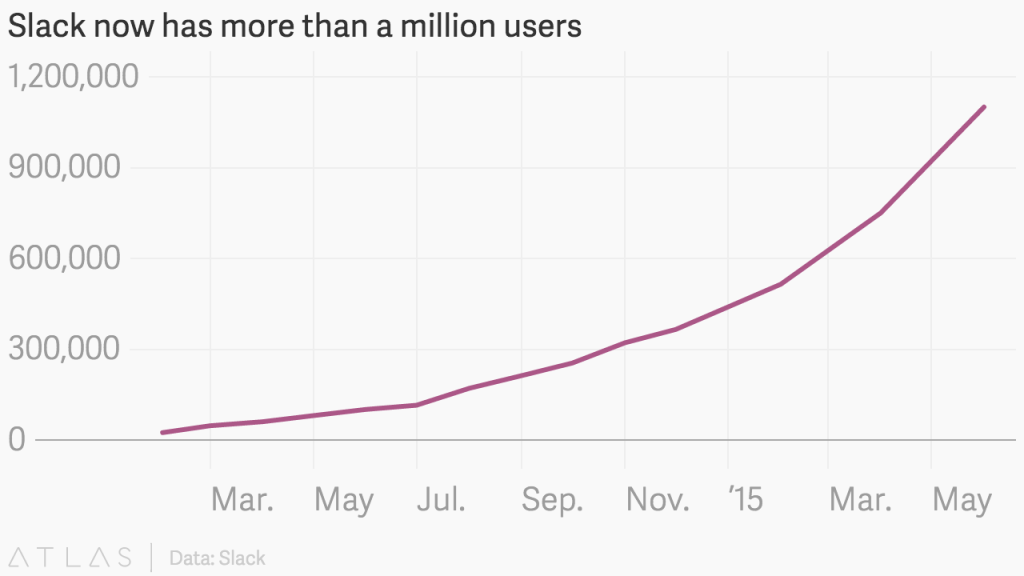Stuff we use.
Workplace communication is changing – it’s becoming freer, more open, collaborative and, importantly, a lot more fun.
Applications such as Slack are responsible for driving this change, and it will change the workplace forever, but not without challenges.
We’ve been a huge fan of Slack since we stumbled across it in March ’14. For us, it consigned so many other tools to the “legacy” box including Skype, Podio and much of Basecamp. And it’s not just us, Slack now has 1m subscribers and a valuation of north of $1bn.

(Courtesy of Atlas Chart from QZ.com)
Slaying old dragons
Slack is the probably the first application that’s got a chance of slaying the “email dragon” – the bane of most of our lives. It doesn’t entirely remove the need for internal email but we’ve seen a 95% drop in internal email since it’s implementation 15 months ago. This is a result.
Skype is another victim, although we still use the venerable old video and calling service, we used Skype for a decade to act as a water-cooler/chat/file-exchange platform and that has been entirely replaced by Slack. There was nothing wrong with Skype, as such, Slack is just a massive step forward in simplicity and usability.
The final victim is our old collaboration friend, Podio, which we started using in 2012. We’d gone through a fair few services including Yammer before we landed on using Podio, primarily as a platform for storing internal processes and data. We still have Podio, but only as a legacy storeroom and it’s hardly touched these days.
Company culture. The power of social.
Work shouldn’t be boring and dull, and here’s where Slack really shines for us. It’s a place for staffers to frolic, share interesting stuff and generally play.
We support the play element in work, happy folks do better work and raise the standard of service we offer to our clients. Its highly interactive nature encourages this play-level interaction that is characterised by its humour and the ability to build bonds between teemies.
New challenges
There are competitors to Slack out there and we’ll see more in the coming years so it needs to stay ahead of the game to avoid becoming the dragon slayed by the next new thing.
It also needs to tidy-up its legal compliance somewhat. Most companies are obliged to store electronic communication in case of a legal or compliance challenge and the unstructured nature of Slack we like so much also presents its greatest challenge.
Social platforms can create social or peer pressure to interact and we’re acutely aware that not everyone is socially gregarious. Effort and resource will need to be funneled to avoid ostracising people and keeping the “big mouths” from spoiling the party. This sounds a bit dramatic, but just take a look at the challenges that Facebook have had to face around cyber-bullying and dealing with “keyboard warriors”.
Corporate seriousness is under threat, whilst we think this is a good thing the reality is that not every corporate culture will see social collaboration as a good thing. Turn your mind to the “Dilbert Scenario” where people are machines working 9 to 5 in cubicles and expected to stick to the job in a joyless environment. Thankfully, these types of companies are unlikely to even agree to use social collaboration, but if they do its likely to be as joyless and useful as the existing dour working environment.
We’re a paying subscriber (it’s less than a tenner a month per active user) but they also have a fully-fledged version that’s totally free. How impressive is that?
If you want to know more about how we implemented and use Slack then drop us an email.
